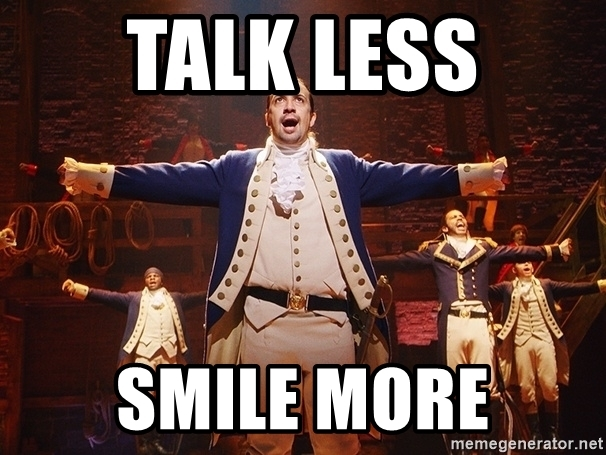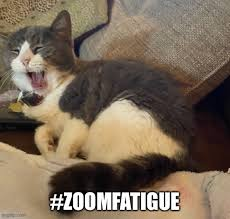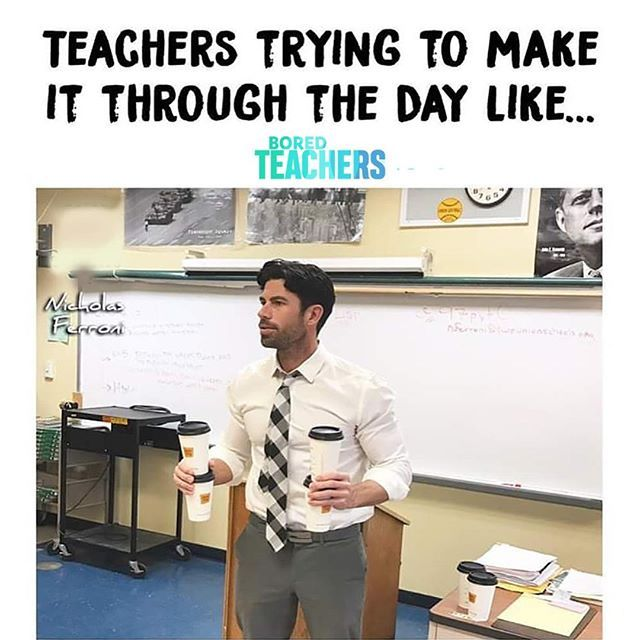In the musical Hamilton, the fictional version of Aaron Burr tries to convince fast-talking, say-whatever-you-think Alexander Hamilton to “talk less, smile more”. What Burr really means is to keep people guessing so they won’t have a reason to dislike him. 
But it’s not a terrible way to think about online & hybrid teaching.
No, not the “keep em guessing“ part. But the teacher-talking-less part is good advice for all of us. And the keep ‘em bonding part is pretty good, too

Teaching is SO WEIRD right now, right? The online part is definitely one of the weirder parts. For most of us, there are a handful of kids who answer questions and participate.
And then there are the silent icons. Silent initials.
Are they listening? Are they learning? Thinking? I have no idea. A bunch of them turn in work. Some of them are just weird lurking icons. They turned off their mics and cameras. Did they turn off the incoming sound and video so they could just watch TV, too?

Their silence unnerves us. As does the repetitive nature of those same four kids who participate.
And so in our awkwardness and discomfort with the silence, we-the-teachers talk into the abyss.
And some days, we talk and talk and talk and talk...
It’s a teacher-talkapalooza. And it makes time slow down and class kind of boring. Even those teachers who are natural-born storytellers (and god help the kids who have teachers like me who aren’t).

Why is this not our best idea?
First, I think of those poor kids who spend 7 periods a day listening to teachers talk all day. Whew. That’s a whole new kind of tired. I also know that as a teacher, it is exhausting to talk all day - and even more exhausting to talk ON SCREEN. All those studies on Zoom Fatigue are real. It’s reason #815 why you’re so tired. It makes the day go soooo sloooowwww....

But there's one thing I do know about learning
That the “person doing the talking (about content) is doing the thinking (about content).
So if the teacher is doing all the talking (about content), the teacher is doing all the thinking (about content). 
If the same four kids are doing the talking, THEY are doing the learning and the thinking.
What are the other kids thinking about?
Who knows? Pizza? Minecraft? Romantic interests? What are they going to eat tonight? Grandpa’s health? Fave tv shows? Tiktok dances? All of those?
But probably not content. They don’t need to. The teacher is doing all the work. So they can kick back and daydream about Kid Thoughts that don’t involve content.
Hey, teacher! Like Aaron Burr says, “talk less”. Maybe have those same four kids talk less, too.
You might ask what else to do instead of talking. These are weird times in which to teach and we can all use some new thoughts.

Here are some ideas:
Chunk your class (with timers!): Use a timer for yourself to only talk for 5 or 8 minutes. Use a timer for how long kids should go watch that video you dropped in the chat. Use timers for how long they should take on bellwork, quickwrites, readings, discussions, or anything else you give them to do. Keep. Class. Hopping! Keep it moving to keep kids engaged.
Use wait time differently: If you want to talk less, it’s only logical that ALL the kids should talk more. But what if they won’t? Wait time hits differently when everyone is silent and unseen. Suddenly, everyone thinks class is over? Or the internet went out? Or the sound stopped working? You can’t just be silent like you could in your all-live class. Nor is it fair to let the only-in-person kids be the only ones to talk. It’s time to use music, a ticking kitchen timer, the Jeopardy tune, or a countdown clock to let them know that you’re waiting -- but that the internet hasn’t actually crashed (not this time, anyway)

Call On Kids: It helps to tell them this ahead of time and not spring it on them like a wacky surprise, but let them know that you are going to call on all of them. And maybe if they answer, it will be for a point somewhere that you have built into participation or something or maybe they get a school “buck” or maybe they can earn a free homework pass or something. But call on every kid. Give them all the opportunity to answer (even if it’s in the chat if they don’t have a mic) You can spin to choose who will answer with Wheeldecide or SuperteachertoolsSpinner OR you can use the RandomNameGenerator Or RandomNamePicker Or any of those tools.But don’t let them off the hook just because they don’t raise their hands. I know, because I have heard from the online kids in the Hybrid class that it is hard, even for the outgoing ones. It’s hard
Make it Fast: Make it a race. For your in-person kids, give them 30 seconds to write a quick response to what you just read/said/wrote/viewed on their desks with dry-erase markers (everyone is cleaning all the time anyway, right? Might as well wipe down desks again. For your online kids, give them the same 30 seconds to put something in the chat (emojis and gifs count ONLY IF they are a response to the thing you just read/said/wrote/viewed). Then, have kids share out their answers if they like. 
Walk Away: Give kids a specific SHORT amount of time to do THE THING you just asked them to do. Like, “You all have 5 minutes to read the first paragraph (or two) and underline/highlight any words you don’t know.” or “Please answer the first two questions on your one paper and we will come back together in 8 minutes (at 11:15) and talk about it.” I am HERE at my desk and in the chat if you have questions”. Then, let them do their thing.
Process, Process, Process: Kids need to process content and information. They need time to “chew” it up. There are 100 ways to do that but some are
Draw something they learned
Talk about it to a partner
Connect it to something they know
Agree/disagree with a statement about the content
Summarize
Address misconceptions
Compare/contrast the content
Examine it from multiple perspectives
Ask questions about what they learned

It’s okay to talk less, even into the silent abyss. But smile more and find ways to make class move at that “lively pace” that you used to have. Make it fun and quick and the kids will learn more.
And guess what -- I promise, that if you end up talking less during your day, you will be LESS TIRED. (I really DO want you to feel better, work less, be less exhausted, and enjoy your job more. One small baby step at a time.
I want to make your day easier. I also want to make it easier (and more successful) for your kids. Hopefully, there are one or two ideas here that will work for you AND for them :)
You got this. Let’s pump up the Pumpkin Spice Lattes and pep up our classes so we can be less tired!
Let me know if I can help! As always, I love to hear from you!
-Tracy